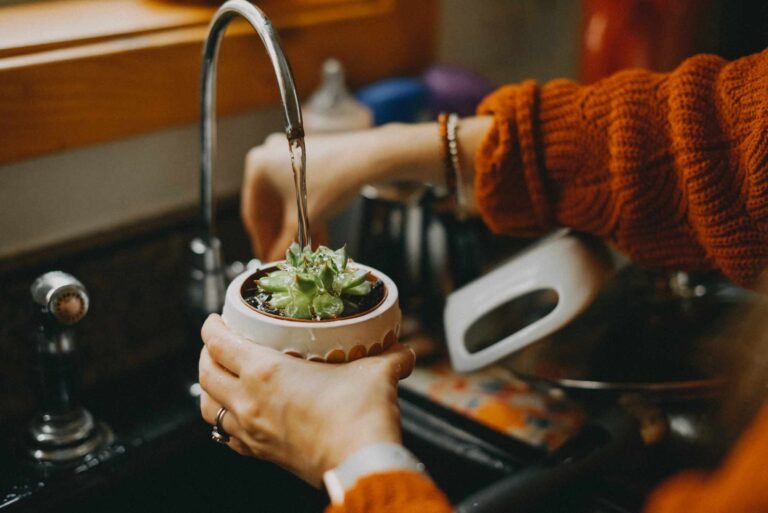:max_bytes(150000):strip_icc():format(jpeg)/is-tap-water-bad-for-plants-d7933027bc6447c69b7c2ca0c2133d34.jpg)
There are a few different ways to water houseplants. Maybe you take a watering can and give your seedlings a little sip of water, or you water them deeply every now and then to really hydrate the soil. Maybe you fill a sink or bucket and let it soak up the water from the bottom.
However, when it comes to water, chances are you’re using tap water. But is that always the best option?
Is tap water safe for your plants? Here’s what a gardening expert says, along with tips for ensuring your water keeps your houseplants happy and healthy.
Meet the expert
Stradley Clay is a horticulturist at Longwood Gardens in Kennett Square, Pennsylvania.
Is tap water safe for plants?
Yes, tap water is safe to use for houseplants, but there are a few things to keep in mind.
“All water is safe to use on houseplants. It depends on how you use it,” says Clay Stradley, horticulturist at Longwood Gardens, a public garden in Kennett Square, Pennsylvania.
City water supplies are often treated with chemicals such as chlorine to kill bacteria and fluoride to prevent tooth decay. These are generally harmless to houseplants, although some exceptions such as orchids and dianthus may be sensitive to these additives.
lyongyuth / Getty Images
Bromeliads benefit from rainwater rather than tap water in their center cups. It is also important to use rainwater, distilled or demineralized water on carnivorous plants such as Venus flytraps, trapdoor flies and pitcher plants.
Hard water, which is high in dissolved calcium and magnesium, can also cause problems for houseplants, preventing them from properly absorbing nutrients.
Many people fix hard water with a water softener, which uses salt to remove excess minerals from hard water. However, salt buildup in your plant’s soil can affect the growth or even kill your plant.
Want more gardening tips? Sign up for our free gardening newsletter for the best growing tips, troubleshooting tips, and more!
Boy_Anupong / Getty Images
Signs That Tap Water Is Not Suitable for Your Plants
Browning tips
“Brown edges or sometimes brittle spots are the most common sign that your plant is being affected by tap water,” says Stradley.
Plants such as calatheas, marantas, and orchids can suffer from these problems due to exposure to chlorine or fluoride in tap water.
Yellow leaves
The high mineral content in hard tap water can actually prevent plant roots from absorbing necessary nutrients.
Including iron, iron deficiency can result in yellow leaves with green veins.
stunted growth
Tap water with a high salt content from a water softener will harm and eventually kill your houseplants over time, first by preventing them from absorbing nutrients from the soil and then by removing moisture from their roots in high concentrations.
This problem may manifest as slow growth and a dull appearance, or it may look like signs of root rot.
Salt accumulation
Watch for salt buildup on your houseplants to prevent stunted growth and more serious problems. Salt appears as a yellow or white deposit on the surface of the soil. It can also build up on the outside of pots made from unglazed clay, such as terracotta.
“Rinsing the plant and rinsing the soil with clean water will wash away excess salts from the soil,” advises Stradley.
Use rainwater or water from a tap that is not connected to a water softener to do this.
JaysonPhotography/Getty Images
How to Make Sure Tap Water is Safe for Your Plants
- Evaluate your plant collection: “Set yourself up for success by knowing which plants may be more sensitive to tap water,” Stradley says, noting that it may not be practical to find tap water alternatives for every plant in a large collection. Instead, add a marker like a colored sticker to each sensitive plant’s container.
- Find out where your water comes from: Stradley advises home gardeners to learn about their tap water, whether it is supplied by a local city or a private well. Stradley also notes that tap water pH is not usually associated with houseplant problems.
- Leave tap water overnight: If you’re concerned that chlorine might affect the appearance or health of certain plants, Stradley recommends filling a watering can or other container with water and leaving it overnight. The chlorine will evaporate before you water your plants the next day.
- Filter your tap water: However, the same strategy doesn’t work for fluoride. Reverse osmosis systems can filter most minerals and additives like fluoride out of tap water, making it ideal for plants, but a typical countertop water pitcher or faucet filter isn’t effective.
Spruce Tree / Jayme Burrows
Alternatives to tap water
- Rain water: “Rainwater is considered the best for watering plants, but the quality can vary depending on where you live,” Stradley says. Rainwater is also difficult to collect in large quantities, so it’s best used for sensitive houseplants.
- Distilled water: Distilled water is purified to remove 99.9 percent of minerals, making it ideal for sensitive specimens like carnivorous plants. However, Stradley warns against using deionized water, as it can be harmful to houseplants.
- Bottled water: “For very specific plants, bottled water can be a good option, but you need to read the label before using it to make sure there are no additives in the water,” Stradley says. Make sure the water is not deionized or comes from a city supply instead of a natural source like a spring or well.
- Dehumidifier water: Desiccated water is not as pure as distilled water, but can still be used to water ornamental plants and houseplants.
